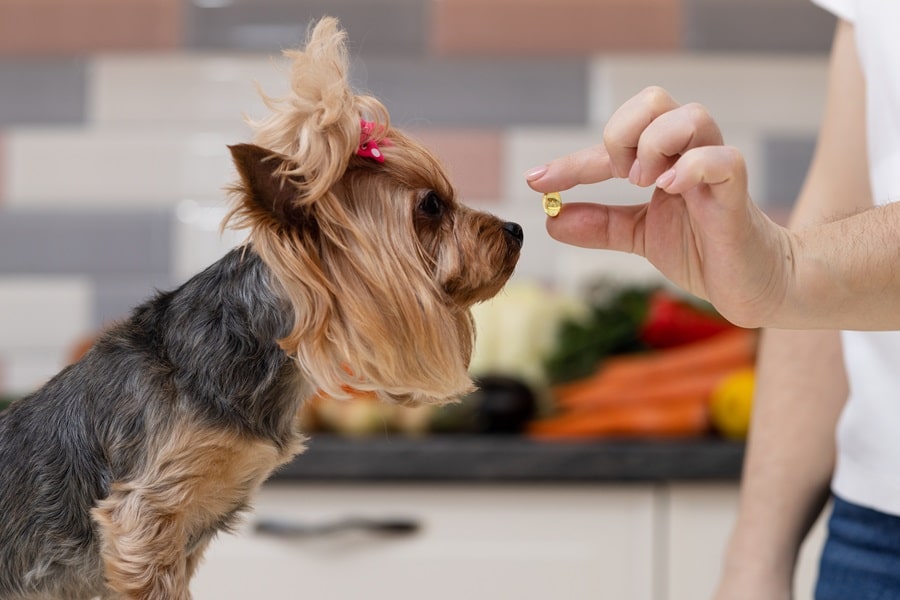Many dog owners enjoy sharing snacks with their pets, but when it comes to dairy products, it’s essential to know which ones are safe and which could cause health issues. Dairy can be a source of nutrients like calcium and protein, yet not all dogs digest dairy well, and some products may even be harmful. This post will guide you through the dos and don’ts of feeding dairy to dogs. By the end, you’ll understand which products can safely be included in your dog’s diet and which should be avoided, ensuring your pet remains healthy and happy.
Contents
- 1 The Nutritional Benefits of Dairy for Dogs
- 2 Safe Dairy Products for Dogs
- 3 Risky Dairy Products for Dogs
- 4 Understanding Lactose Intolerance in Dogs
- 5 The Puppy Exception: Dairy in Young Dogs
- 6 Frequency and Portion Control
- 7 Alternative Sources of Calcium and Protein
- 8 Consulting Your Veterinarian
- 9 Ensure Dairy Does Right by Your Dog
The Nutritional Benefits of Dairy for Dogs

Dairy products contain beneficial nutrients that can contribute to a dog’s health, primarily calcium, which is crucial for bone strength, and protein, which supports muscle function and repair. Including small amounts of certain dairy products in your dog’s diet can supplement these nutrients effectively. It’s important, however, to understand that dogs have different nutritional requirements from humans, and not all dairy is suitable for them.
Despite these benefits, dairy should not be a primary source of nutrients for dogs. Dogs can receive all the calcium and protein they need from a well-balanced dog food formulated specifically for their dietary needs. Introducing dairy as a supplement should be done cautiously to ensure it does not disrupt the balance of their overall diet. Overfeeding dairy can lead to obesity or other nutritional imbalances, so moderation is key when including these foods in your dog’s diet.
Safe Dairy Products for Dogs

Certain dairy products are safer for dogs and can be included in their diet in moderation. Plain yogurt, especially those without added sugars or artificial sweeteners, can be a good choice. It contains live bacterial cultures that may help support the digestive system. Similarly, softer cheeses like cottage cheese have lower lactose levels, making them easier for dogs to digest compared to harder cheeses.
Introducing these dairy products should be done gradually to assess your dog’s ability to tolerate these foods without adverse effects. Start with small quantities, and if there are no signs of digestive distress, such as bloating, gas, or diarrhea, it may be safe to continue. Just be sure to always observe your dog’s reaction closely and decrease the amount at any signs of discomfort.
Risky Dairy Products for Dogs

Not all dairy is dog-friendly, and certain products should definitely be avoided. Ice cream, for instance, not only contains high levels of sugar but often includes xylitol, an artificial sweetener that is toxic to dogs. The high-fat content in products like whipped cream and butter can also lead to pancreatitis, a severe and painful inflammation of the pancreas.
Furthermore, these products offer no nutritional benefits to dogs and are loaded with calories that can contribute to weight gain. Keeping such high-risk dairy products out of your dog’s diet is essential to prevent both immediate health crises and long-term health issues like obesity or diabetes. Always ensure dairy treats are safe for dogs before offering them, and consider healthier alternatives.
Understanding Lactose Intolerance in Dogs

Many dogs lack the enzyme lactase, which is necessary for breaking down lactose found in milk and other dairy products. This deficiency leads to lactose intolerance, where consuming dairy products causes symptoms like diarrhea, vomiting, and abdominal pain. Noticing these signs after your dog consumes dairy strongly suggests lactose intolerance.
If your dog exhibits symptoms of lactose intolerance, it’s crucial to adjust their diet accordingly. Avoid giving them milk or dairy products that contain lactose, and consult your veterinarian for advice on managing their diet. There are many lactose-free alternatives available that allow your dog to enjoy the taste of dairy without the discomfort.
The Puppy Exception: Dairy in Young Dogs

Puppies process dairy differently compared to adult dogs, primarily because they are naturally equipped to digest their mother’s milk. This capability generally decreases as they grow and are weaned off their mother’s milk, transitioning to solid foods. During this transitional period, small amounts of certain dairy products can be beneficial, serving as a soft, palatable introduction to more diverse foods. However, it’s important to adjust the type and amount of dairy as the puppy grows to avoid digestive issues.
As puppies grow older, their ability to digest lactose diminishes, mirroring the lactose intolerance seen in adult dogs. Therefore, while a puppy might initially tolerate dairy without any apparent issues, it’s crucial to monitor their response and gradually decrease dairy intake as they age. This approach ensures that puppies develop a diet suitable for their long-term health, focusing on nutritionally balanced dog foods designed for their specific growth stages.
Frequency and Portion Control

Feeding dogs dairy should always be done in moderation, regardless of the type of dairy product. The key to safely including dairy in your dog’s diet is not only choosing the right products but also controlling the frequency and portion sizes. Small, infrequent servings can provide variety and extra nutrients without overwhelming your dog’s digestive system. This moderation helps prevent the common pitfalls of overfeeding, such as obesity and gastrointestinal distress.
It is recommended to treat dairy as an occasional treat rather than a regular part of the diet. For example, adding a spoonful of plain yogurt to a dog’s meal once a week can enhance flavor and provide probiotics without significant risks. Always keep a close eye on portion sizes relative to your dog’s size and overall dietary needs, and consult with a vet to ensure that these treats are appropriate for your pet’s specific health profile.
Alternative Sources of Calcium and Protein

While dairy can be a source of calcium and protein, there are many other ways to ensure your dog receives these essential nutrients without the risks associated with dairy. Foods like green beans, broccoli, and commercial dog foods fortified with calcium are excellent alternatives that provide the necessary nutrients in a form that is safe and easy for dogs to digest. Including these alternatives in your dog’s diet can reduce the reliance on dairy and prevent the potential for lactose-related issues.
Protein is particularly important for dogs, and it can be sourced from meats, legumes, and specially formulated dog foods. These sources provide high-quality protein without the lactose found in many dairy products. For dog owners looking to avoid animal products, vegetarian and vegan dog foods are available that meet all nutritional standards. However, always consult with a veterinarian before switching to a specialized diet to ensure it meets your dog’s specific needs.
Consulting Your Veterinarian

Before making any significant changes to your dog’s diet, including introducing or increasing dairy consumption, it is crucial to consult with a veterinarian. A veterinarian can provide personalized guidance based on your dog’s individual health, age, breed, and dietary requirements. This expert advice is invaluable, especially when considering foods that might cause allergic reactions or digestive issues in some dogs.
Veterinarians can also offer recommendations for dietary adjustments and alternative food options if dairy proves unsuitable for your pet. Regular check-ups help monitor the impact of dietary changes and ensure that your dog maintains optimal health. Remember, each dog is unique, and what works for one might not be suitable for another; professional guidance helps tailor dietary choices to the best interest of your specific pet.
Ensure Dairy Does Right by Your Dog
Incorporating dairy into your dog’s diet can offer benefits if chosen wisely and used sparingly. As pet owners, it’s our responsibility to ensure that the treats we provide are not only enjoyed by our dogs but also contribute positively to their health. Always start with small amounts, observe your pet’s reactions, and consult with your veterinarian to make informed decisions about dairy and other dietary choices. By prioritizing your dog’s health and nutritional needs, you can create a balanced and joyful eating experience for your furry friend.


